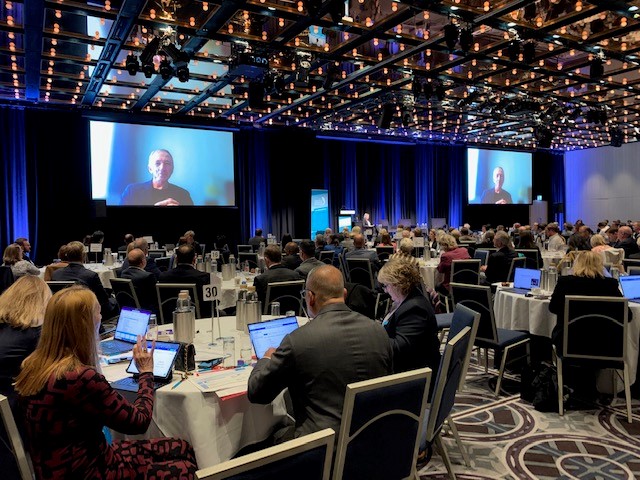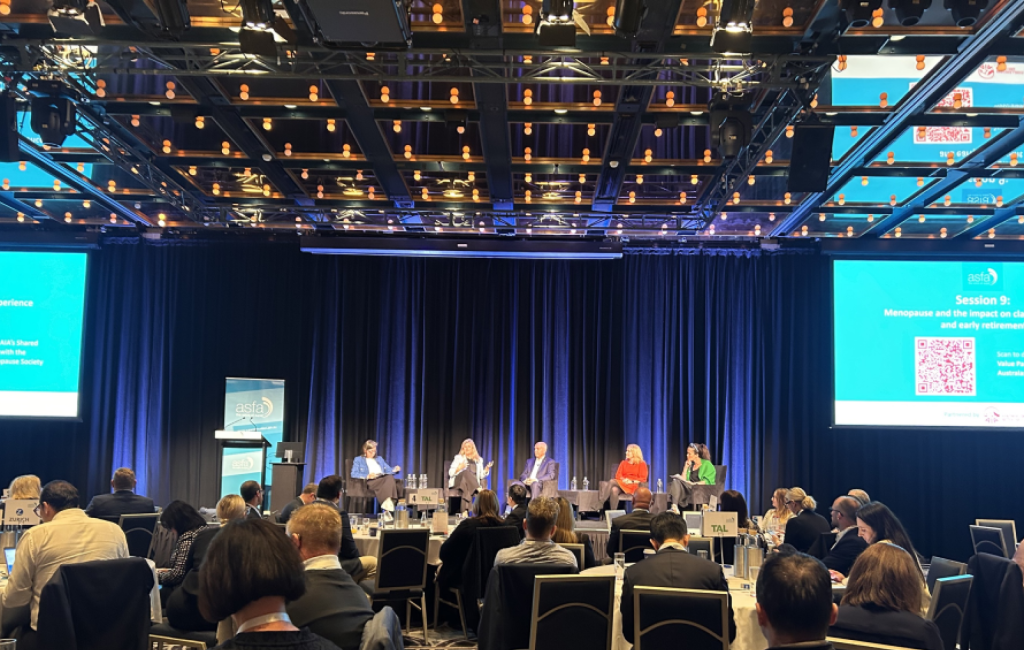Insurance remains ‘fit for purpose’
With a defined objective of superannuation on the legislation table, it was fitting that the event kicked off with a discussion on where group insurance is likely to fit in the future and what members will be able to expect. TAL’s Jenny Oliver, Adam Nettheim from CSC and Richard Land from AustralianSuper agreed that insurance through super is self-funded, efficient, sustainable, and very widely available in contrast to the challenges faced by NDIS and workers compensation. A poll taken on the day revealed that 71 per cent of delegates would like to see an explicit reference to insurance in the purpose of super.
Some of the main challenges in insurance are around claims handling. Claimants are nearly always stressed and claims can be complicated. Mental health conditions can be difficult to assess and even more difficult to treat. Tetiana George from Curium agreed with Deloitte’s Jenni Baxter about the importance of personal touch and empathy when dealing with claims and claimants, but George also outlined the role that AI can play in providing structured and automated claims handling. However, the avatar claims officer (shown in a video to the audience) may still be a way off as educating the algorithm (with empathy) is a real challenge for life insurance! Understandably ASIC expects that AI and other tools must be well supervised by the AFSL holder.

Mental health conditions are some of the most common grounds for TPD claims and both claims processing and treatment can be very protracted. The audience was treated to a fascinating presentation by psychiatrist and Monarch Medical Group co-founder, Ted Cassidy, chaired by Zurich’s Sally Phillips, about how psychedelic drugs might assist recovery time for those with chronic depression or PTSD. However, availability and out of pocket expenses are challenges, with the role that insurers would play still unclear.
Data the word on everyone’s lips
The session with the regulators, APRA’s Peter Kohlhagen and ASIC ‘s Jane Eccleston, chaired by KWM’s Sarah Yu, made it clear they value insurance in superannuation, but emphasised its need to provide value for those insured. They said improved data is needed to understand whether the needs of different member cohorts are being properly met and outlined the importance of better ongoing communication with fund members.
Life insurance is inherently a pooled product, but improved data might help with understanding whether a specific cohort is unfairly disadvantaged (or advantaged). It was great to have the regulators in the room and hear that their preferred objective is to enable better outcomes for members. There is certainly a common aim here between the regulators and the industry.
MetLIfe’s Meray El-Khoury, Alexis Harrison from Equip and Chair Rachael Lavars from Elantis Premium Funding agreed that the value proposition for insurance will continue to develop as better use of data becomes available. Understanding impacts and building better tools will help the industry to better support members at the times they need it most.
Mercer’s Tim Jenkins discussed the complexities and usefulness of premium adjustment mechanisms with EY’s Dale Jackson as Chair, and an important tip being to consider possible exit strategies upon the commencement of the arrangement.
Innovation, menopause, and insurance retirement products
Session seven on financial literacy and financial resilience showed the direct impact on financial wellbeing and positive mental health outcomes. The panel comprising MLC Life’s Alison Bodinnar, Insignia Financial’s Kerry Vogel and Chair Andrea Piaia from WTW acknowledged there can be a double stigma for those struggling with both their financial situation and their mental health.
Session eight looked at the drivers of innovation being simplified products; convergence of life and health, and a move from static to more dynamic cover. Penny Pare from ART and Chari Angat Sandhu from McKinsey Insurance
Practice discussed how investing in customer insights, speed and cross-functional teams can unlock innovation, and the need to trade off the benefits from customisation with those that come from greater scale.

Mayflower Consulting’s Sarah Penn chaired an insightful and candid dialogue about menopause and perimenopause and their huge impact on women, the ripple effects on families and colleagues, and the productivity/opportunity loss for working women. AIA’s Simonie Fox, Rod Baber AM, Clinical Professor, Obstetrics, Gynaecology and Neonatology, University of Sydney, and Lydia Ho from Future Super took part in an informative and lively panel discussion.
The final frontier and farewells
In the final session KPMG’s Melinda Howes chaired a discussion with Hannover Life Re Australia’s Darragh Monaghan and Frederik Tietz, and Estelle Liu from Aware Super on retirement products, with annuities in Australia currently priced solely on age and gender. However, fairer pricing could come from medical underwriting of other indicators linked to average life expectancy – meaning a person who is a smoker, with diabetes and colon cancer from a low socio-economic group could get a much-enhanced annuity.
ASFA Chair Gary Dransfield brought the day to a close with a short recap of the program and a few kind words of appreciation and farewell to outgoing ASFA CEO Martin Fahy leaving after seven years at the helm.









